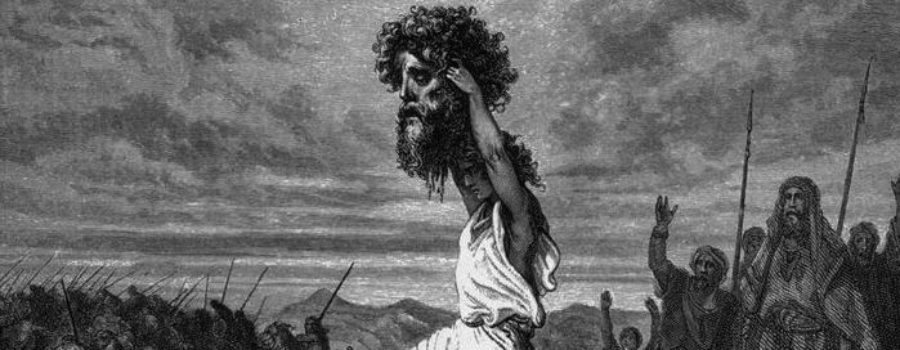I would like to continue expounding on the second unexpected source of blessings, namely, blessings hidden in small things; for as we have seen, God puts great importance on what is considered common and unpretentious.
Actually, when we speak of perfection we refer to the tuning of small things. I think all of us will agree that the difference between a worker and a perfectionist is that the latter puts importance on small things while the former counts them of minor importance. God is a perfectionist and has special blessings for those who long for perfection, and these blessings are often hidden in small things. It might be small decisions, small expressions of faithfulness, or small services seen by Him alone; but therein are hidden heavenly treasures.
David’s example
David was one of those who valued small things. As his oldest brother reminded him, David was shepherding a very small flock: “Why did you come down here? And with whom have you left those few sheep in the wilderness?” (1 Sam. 17:28). Nonetheless, David was putting all his heart into it. On one occasion he told Saul:
Your servant used to keep his father’s sheep, and when a lion or a bear came and took a lamb out of the flock, I went out after it and struck it, and delivered the lamb from its mouth; and when it arose against me, I caught it by its beard, and struck and killed it” (1 Sam. 17:34,35).
The size of the flock was not important for David. He valued each sheep in particular because it was his father’s sheep.
Saul’s worldly mind
Saul was one of those despising what is considered unsuited. When David told him: “Let no man’s heart fail because of him; your servant will go and fight with this Philistine”, he answered him:
You are not able to go against this Philistine to fight with him; for you are a youth, and he a man of war from his youth” (1 Sam. 17:33).
Obviously, Saul could not discern that the blessing of God was hidden in this youth. And he could not discern it because his mind was contaminated by worldly prejudices. He would have preferred someone trained and prepared, a person of experience, someone who would have graduated from a Bible School so to speak. But God was going to do it His way, not men’s way.
There is a lesson for us here, for we also have the tendency to put our trust on human preparations and abilities, on human charisma and impressive personalities. Actually, the tendency seems to be growing and turning into a dangerous trend.
What about the preparation coming from above, the training taking place between a holy God and a common man? This is the way David was formed, in a place where the human eye could not penetrate.
Goliath’s distorted assessment
Goliath was another looking down on what appeared an unimpressive candidate: “And when the Philistine looked about and saw David, he disdained him; for he was only a youth, ruddy and good-looking” (1 Sam. 17:42).
The point I am trying to make here is that too often we, believers, let worldly concepts affect our mind as unbelievers do. We may think the battle will be easy because we are confronted with something insignificant in appearance. Other times we put no hope on divine vessels because they don’t match our distorted criterion. So on one hand we lose the battle and on the other the blessing.
Goliath had faith in himself because he was a trained champion and very impressive. He had all the characteristics the carnal mind considers spectacular and breathtaking. Consequently, he inculcated fear in the heart of an entire army. Little he knew that a lad would defeat him, for David was at the most 15 years old when he faced Goliath.
David’s age
David’s age is drawn from the fact that only those of 20 years old and more were obliged to go to war (Numbers 1:3 & 45). Since the Scripture testifies that only “the three oldest sons of Jesse had gone to follow Saul to the battle” (1 Sam. 17:13), we can deduce that the five youngest sons had lest than 20 years of age (Jesse had eight sons, see 1 Sam. 17:12). Being that David was the youngest of the eight (1 Sam. 17:14) he had at the maximum 14 or 15 years old when he killed Goliath. Added to it, there is a possibility that the last five children had more than a year difference. Consequently, David could have been 12 or 13 years old when he fought Goliath. Yet the blessing of God was hidden in this lad.
The trap of impressiveness
When the time came for Samuel to anoint a king that would take the place of Saul, he was sent to the house of Jesse. As soon as he saw Eliab—Jesse’s oldest son—he was greatly impressed: “So it was, when they came, that he looked at Eliab and said, “Surely the Lord’s anointed is before Him!” (1 Sam. 16:6). Happily, God rescued the situation and told Samuel:
Do not look at his appearance or at his physical stature, because I have refused him. For the Lord does not see as man sees; for man looks at the outward appearance, but the Lord looks at the heart” (1 Sam. 16:7).
Even Samuel was about to make a blunder due to human prejudices. How long will it take for us to learn that His thoughts are infinitely above ours? When the Scripture attests that our mind must undergo a renewal, it doesn’t present a proposal but an absolute necessity.
The father of David
Jesse also despised David. When Samuel came to visit him he left his youngest son in the field, for he could not perceive that the blessing of God was hidden in him? (1 Sam. 16:11).
The ultimate question
I close with a question the Lord asked Baruch the son of Neriah:
The word that Jeremiah the prophet spoke to Baruch the son of Neriah, when he had written these words in a book at the instruction of Jeremiah, in the fourth year of Jehoiakim the son of Josiah, king of Judah, saying, 2 “Thus says the Lord, the God of Israel, to you, O Baruch: 3 ‘You said, “Woe is me now! For the Lord has added grief to my sorrow. I fainted in my sighing, and I find no rest.”’ 4 “Thus you shall say to him, ‘Thus says the Lord: “Behold, what I have built I will break down, and what I have planted I will pluck up, that is, this whole land. 5 And do you seek great things for yourself? Do not seek them; for behold, I will bring adversity on all flesh,” says the Lord. “But I will give your life to you as a prize in all places, wherever you go”’” (Jer. 45:1–5).
Why should we seek great things for ourselves when God hides some of His greatest blessings in humble vessels? Possibly Baruch thought Jeremiah was going to turn the children of Israel back to God as other prophets had done before him. He might have dreamed to become then minister of interior affairs. But God had another plan and His blessing was hidden in it. God was going to give Baruch’s life to him as a prize in all places, wherever he would go. Was this prize too little for Baruch? What about me? Do I seek great things for myself?
May the Lord give us understanding and wisdom so we may discern between what is valuable and what is not.
On my next post I will continue to write about the second unexpected source of blessings, i.e., blessings hidden in small things.
If you think this post can help somebody you can share it with the options presented bellow.













